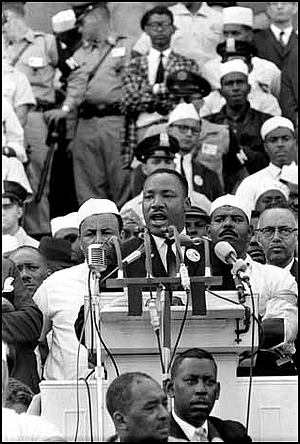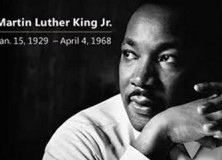The “I Have A Dream” speech given from the steps of The Lincoln Memorial on August 28, 1963 brought more attention to the plight of the black American than its original plan of ensuring a voting rights bill would pass in Congress. The Federal bill was to be a guarantee of the right to vote in southern states. States like Alabama, where blacks were often unable to vote due to restrictive requirements imposed upon them.
Alabama’s Governor George Wallace had given an inaugural address in January of that year, vowing to oppose desegregation.

Martin Luther King, Jr. responded to Wallace’s inaugural address in a series of speeches. In the first three months of 1963 he traveled to 16 different cities, speaking about the need to take action against the injustices of segregation. Later that year King gave his historic I Have A Dream speech in front of the Lincoln Memorial. The only person identified in that speech is Wallace:
| “ | I have a dream that one day, down in Alabama, with its vicious racists, with its governor having his lips dripping with the words of “interposition” and “nullification” — one day right there in Alabama little black boys and black girls will be able to join hands with little white boys and white girls as sisters and brothers. | ” |
 Later in life Wallace changed his views on segregation and came to regret his famous phrase, calling it his “biggest mistake”.
Later in life Wallace changed his views on segregation and came to regret his famous phrase, calling it his “biggest mistake”.
| “ | I didn’t write those words about segregation now, tomorrow and forever. I saw them in the speech written for me and planned to skip over them. But the wind-chill factor was 5 below zero when I gave that speech. I started reading just to get it over and read those words without thinking. I have regretted it all my life. | ” |
Regardless of his feelings at the time, the sentiments expressed in his inaugural address were blamed for creating “a climate that allowed for violent reprisals against those seeking to end racial discrimination.” Wallace’s defiant endorsement of segregation proved to be his most memorable piece of political rhetoric and demonstrated the fierce opposition facing the Civil Rights Movement.
King’s vision of a positive future was a sharp contrast from Wallace’s demand to prolong the discrimination which had long prevented many Americans from exercising their civil rights. King portrayed segregation and its supporting rationale of states’ right as relics of the past which would not exist in America’s future. This view was reinforced in 1965 when King delivered a speech in front of the Alabama State Capitol in which he directly replied to Wallace’s call for continued segregation, saying he believed “segregation is on its death bed in Alabama, and the only thing uncertain about it is how costly Wallace and the segregationists will make the funeral.
Disclaimer: On January 4, 2016, the owner of WestEastonPA.com began serving on the West Easton Council following an election. Postings and all content found on this website are the opinions of Matthew A. Dees and may not necessarily represent the opinion of the governing body for The Borough of West Easton.







